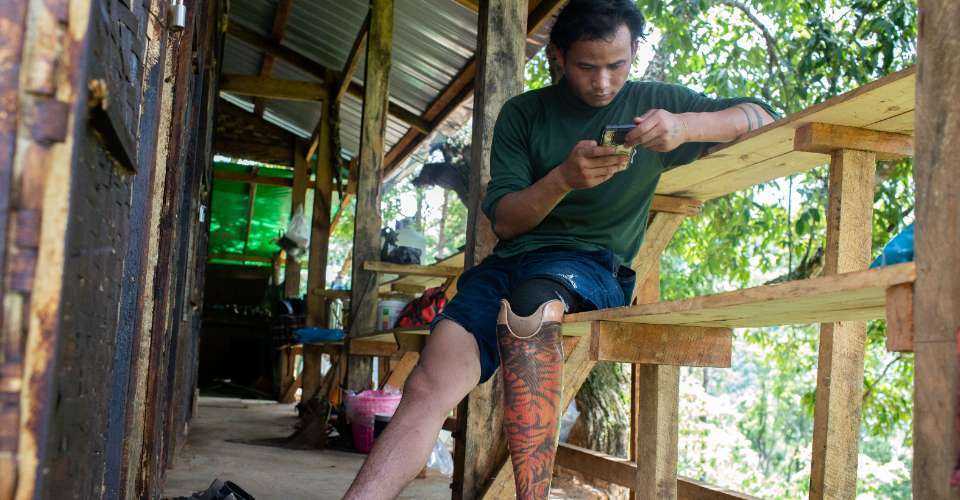
A member of an anti-junta group who lost a leg to a landmine uses his mobile phone. (Photo: AFP)
A Thai SIM card has become a prized possession for John Mang (name changed on request).
Mang owns a pharmacy store in Myawaddy Township on the Myanmar-Thai border. The 34-year-old Myanmar national has been using internet service from neighboring Thailand to bypass barriers imposed by the ruling military, such as banning virtual private networks (VPNs) services.
Though the vital trading point between Myanmar and Thailand has better accessibility, the store owner still requires a VPN to access Myanmar's internet infrastructure.
A 30-year-old woman from Kyonpyaw township in the Ayeyarwady region was forced to shut down her online business due to the military's restrictions on VPNs at the end of May.
Visitor traffic to her online store has declined drastically, and her business has taken a beating.
A 26-year-old high school teacher from Maubin Township in the same region is experiencing hurdles to continue online classes. It has become difficult to access education apps in the civil war-hit nation after a ban on VPN software, which helps mask users’ location.
The junta, which came to power after toppling the civilian government of Aung San Suu Kyi, imposed the ban as ethnic armed rebels were giving the military regime a tough time.
Soon after the 2021 takeover, people relied heavily on social media, especially Facebook, to organize protests. However, the army banned it.
People banked on VPNs to hide their browsing history and phone locations from the ruthless regime to bypass the barriers.
There has been a high demand for VPN services in the nation. People are forced to rotate through multiple VPNs because the army did not block all VPN services in the country.
VPNs use third-party computers, making it impossible to probe what the users are connecting to.
Since the ban started last month, online retail sellers, teachers, and businessmen have complained of difficulties using social media, uploading videos and posts, and sending messages.
They are now finding it hard to circumvent the restrictions. The crackdown includes random street searches of people's mobile phones to check for VPN applications.
“They [army] are violating Article-19 of the Universal Declaration of Human Rights. They fear the world will learn more about their crimes,” said a senior official attached to the shadow National Unity Government.
The official noted that there has been no internet connectivity for a long time in conflict-stricken areas like the Sagaing Region, Rakhine, and Chin State.
People in the nation are trying to overcome the crisis on their own.
The Japanese embassy in Myanmar has announced the launch of an official Telegram channel.
In a statement on June 19, the mission said, “The official Telegram channel of the Embassy of Japan in Myanmar has been launched. Please join our channel to update information."
However, other embassies have yet to follow suit.
In 2021, the military government drafted but did not enact a cybersecurity law to punish anyone who uses a VPN without the official nod. It calls for a maximum three-year jail term and a fine of 5 million Myanmar kyats (US$1,125).
High-grade interception technologies are in place to capture internet traffic to Myanmar.
The junta is seeking Chinese technical know-how to censor and intercept the traffic to the nation’s internet, according to a recent report from Justice for Myanmar, a human rights advocacy group.
Chinese firms have joined hands with local companies as part of the junta’s efforts to form a digital dictatorship in Myanmar, industry experts say.
China's advanced technological infrastructure allows comprehensive monitoring and control of service providers. Data packets, including internet activities, can be recorded, tracked, and examined. It can also identify email content and even phone messages.
Under a security-enhanced approach that prioritizes censorship and surveillance, the junta is planning to maintain its tight grip on digital space as it faces strong challenges from pro-democracy guerrillas.
Myanmar is already the second-worst country after China for internet freedom violations.
If the junta’s dream of digital dictatorship succeeds, normal life will be hit hard in the nation.




Share your comments